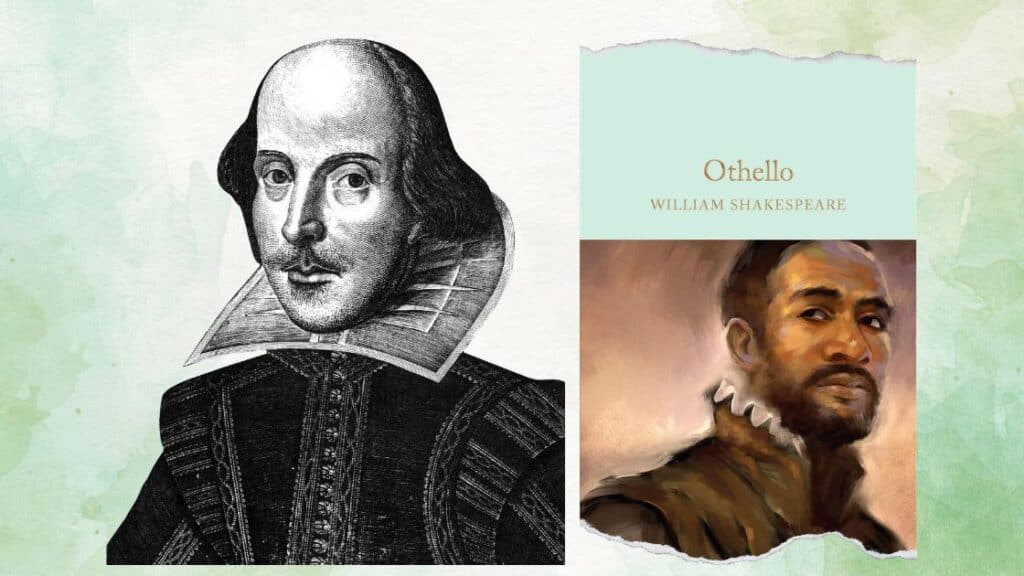Last Updated on February 2, 2024 by BiblioLifestyle

William Shakespeare’s Othello is a dramatic tale of love, jealousy, and deceit. It is a timeless piece of literature that continues to captivate and challenge readers centuries after it was first performed. Of all the works by Shakespeare that I’ve read, I believe Othello is one of Shakespeare’s most complex and compelling plays. Every time I revisit it, I discover something different, but ultimately, what you’ll discover is that Othello delves into the depths of human emotion, juxtaposing the powerful bond of love with the intricate web of racism, jealousy, and betrayal. So in this article, I will share Othello’s central themes, its pivotal characters, and the play’s profound and enduring impact on the world of literature and beyond.
About Shakespeare’s Othello
Summary
William Shakespeare’s “Othello” is a dramatic tragedy that delves into the themes of jealousy, love, betrayal, and racism. Set against the backdrop of Venice and Cyprus during the Ottoman-Venetian war, the story revolves around Othello, a Moorish general in the Venetian army. Othello secretly marries Desdemona, the daughter of a nobleman, sparking resentment and racial prejudice among those around them. Driven by malice, the envious ensign Iago orchestrates a devious plot to unravel Othello’s life, planting seeds of doubt about Desdemona’s fidelity. Othello’s trust in Iago and his own insecurities lead him down a dark path of jealousy and rage. The tragic arc concludes with the heart-wrenching realization of the truth and the irreversible consequences of jealousy and manipulation, resulting in the deaths of Othello, Desdemona, and Emilia, and the exposure and punishment of Iago. The play is a powerful examination of the destructive power of false appearances and the human propensity for destructive emotions.
BUY A COPY OF OTHELLO ON AMAZON OR BOOKSHOP
The Historical Tapestry of Othello
Set against the magnificent backdrop of the 16th century, Othello invites us into the vibrant Republic of Venice, a bustling hub of trade and cultural exchange. In this era of great societal upheaval, the play skillfully weaves together the complex tapestry of exploration, colonization, and the burgeoning rise of mercantilism. As the world expanded, we see coming to the surface a clash of cultures and ideas, tensions simmering beneath the surface, and the setting of the stage for the profound conflicts that unfold in the intricately woven plot of Othello.
With its nuanced exploration of power, jealousy, and the destructive forces of prejudice, Shakespeare’s timeless tragedy continues to captivate audiences, offering a profound reflection on the human condition and the timeless themes that resonate across the ages.
Venetian Society and Power Dynamics
In the unique world of the Venetian court, we witness the hierarchical power structures at play. Othello, a highly respected and distinguished Moorish general, challenges the norms of a predominantly white society. His marriage to Desdemona, a young Venetian woman, further underscores the tension between the traditional order and the forces of change.
Military Might and the Subjugation of Others
Othello’s prominence as a war hero cannot be overlooked. His military exploits cement his position within a society that values might and prowess. However, his success also ties into the complex theme of the “other.” As a Moor, Othello represents people who are from different ethnic groups, cultures, and traditions existing on the periphery of traditional European mores. So we see how this duality plays a significant role in the questions of identity, belonging, and prejudice that the play navigates.
Key Characters in Shakespeare’s Othello
The characters in Othello are not merely players on the stage but complex individuals whose lives intersect with fate in a tragic dance of passion and pathos.
Othello: The Tragic Hero
Othello stands as a tragic hero, marked by his honorable status and his ultimate downfall driven by internal and external conflicts. A man of bravery and prowess on the battlefield, Othello is a character high in the military ranks, earned by his valor and leadership. Yet, despite his esteemed position, he is relentlessly subjected to the racial prejudice of the society he serves. His identity as a Moor places him in an unyielding paradox; he is both a revered general and a vulnerable outsider. It is this vulnerability that Iago, with his malevolent cunning, exploits to drive Othello to jealousy and rage. Othello’s character arc demonstrates how even a man of great moral integrity can be dismantled by the strains of insecurity and manipulated by the seeds of suspicion, leading to tragic consequences. His personal journey embodies the timeless struggle between the noblest virtues and the darkest human emotions.
Iago: The Manipulative Villain
Iago stands in stark contrast to Othello as Shakespeare’s incarnation of the quintessential villain. His complex character is driven by an intense malice, cloaked under a facade of loyalty. Iago’s manipulation is not born of impulse but is a deliberate and calculated effort to unravel the lives around him for his twisted satisfaction. The inscrutability of his motives renders him more menacing, as he weaves deceit with finesse, ensnaring his victims in a web of lies and half-truths. What is most striking about Iago is his remarkable understanding of human psychology, which he employs to orchestrate the downfall of those he resents. Charismatic yet sinister, Iago personifies evil in its most intelligent and destructive forms, challenging the moral fabric of the world he inhabits and leaving chaos in his wake.
Desdemona: The Innocent Victim
Desdemona emerges as the embodiment of innocence and the tragic victim within the catastrophic web that unfolds in ‘Othello.’ Her pure and unwavering love for Othello makes her a poignant figure against the backdrop of deceit and treachery. Desdemona’s characterization challenges the gender norms of her time; she is bold in her decision to marry Othello, defying social boundaries and familial expectations. Yet, her assertive nature belies a vulnerability to the manipulations surrounding her. As a symbol of goodness, she stands in stark contrast to the malice and corruption of Iago, representing the light of truth that unfortunately dims as the tragedy progresses. Her unwarranted demise is a powerful indictment of the insidious nature of jealousy and a sobering example of how innocence can be caught in the crossfire of others’ vendettas.
Cassio: The Epitome of Lost Reputation
Cassio, Othello’s loyal lieutenant, emerges as a significant figure whose fate intertwines with the play’s exploration of reputation and honor. Initially portrayed as young, handsome, and charismatic, Cassio possesses all the outward traits that garner respect in Venetian society. However, his vulnerability becomes apparent when Iago cunningly orchestrates a scenario that besmirches his reputation, leading to his demotion and subsequent quest for redemption. Cassio’s downfall is emblematic of how quickly honor can be undone by circumstance and deceit. His character can be seen as a foil to Othello—whereas Othello’s fall is driven by internal turmoil, Cassio’s is due largely to external manipulations, highlighting the damaging and far-reaching impact of Iago’s villainy.
Emilia: The Voice of Reason and Witness to Tragedy
Emilia, Iago’s wife and Desdemona’s attendant, stands out as a crucial but often underrated character in “Othello.” Her journey reflects a sharp intellect and growing disillusionment with the male-dominated world she inhabits. Initially, she may seem to be complicit in Iago’s schemes, particularly when she obtains Desdemona’s handkerchief, an action that significantly contributes to Othello’s doubts. However, as the narrative unfolds, Emilia’s character blooms into that of a moral compass, boldly speaking against gender biases and the unfair treatment of women. In her final act of defiance, Emilia becomes the herald of truth, exposing Iago’s heinous acts despite the grave risks. Her dramatic revelation acts as a catalyst for the ultimate unraveling of Iago’s web, shifting her role from a passive observer to an active participant in seeking justice. Her tragic end, much like Desdemona’s, underscores the grim consequences that can befall those entangled within the destructive cycle of deceit and vengeance.
BUY A COPY OF OTHELLO ON AMAZON OR BOOKSHOP

Themes in Shakespeare’s Othello
Othello is a rich tapestry of themes that reflect the nuances of the human experience. Each strand weaves a deeper understanding of our complexities, weaknesses, and, at times, our monumental failures.
Jealousy and Betrayal
Central to Othello’s devastating arc is the theme of jealousy. Iago, the play’s arch-villain, masterfully manipulates Othello’s love for Desdemona, sowing the seeds of suspicion and mistrust. The transformation of Othello from a confident and loving husband into a jealous and vengeful figure is a testament to the corrosive nature of envy and the fragility of trust.
Racism and Prejudice
The play’s exploration of race is as profound as it is disquieting. Othello’s experience as an ‘outsider’ in Venetian society is fraught with tension. He must navigate a culture that, despite its veneer of openness and civility, harbors deep-seated prejudices. Plus, Shakespeare’s portrayal of Othello as a noble, high-ranking, and dignified character serves to highlight that despite his status in society, he is still viewed as an ‘other,’ a Moor, and not fully accepted by the majority.
Appearance vs. Reality
The theme of appearance versus reality is cunningly played out through the characters’ lives. Nothing is as it seems, and the audience is constantly challenged to discern the truth from the lies. The play serves as a sobering reminder of the dangers of hastily formed perceptions and the not-so-subtle art of deception.
Love and Loyalty
In juxtaposition to the destructive forces of jealousy and betrayal, we see the powerful bond of love between Othello and Desdemona. However, this deep connection is tested by external forces that seek to undermine their relationship. The theme of loyalty also comes to the forefront, with characters forced to choose between their duty and their conscience.
Manipulation and Deception
Iago, the play’s Machiavellian figure, is the epitome of deviousness. His motivations, often debated by readers and scholars, range from personal slights to a generalized disdain for the human condition. Iago’s manipulation of Othello, Cassio, and others is not merely a tool for advancement; it is a game of psychological warfare. His malevolent intelligence and strategic cunning make him one of the most compelling villains in the Shakespearean pantheon.
BUY A COPY OF OTHELLO ON AMAZON OR BOOKSHOP
The Impact of Othello on Literature and Beyond
Since its first performance in 1604, “Othello” has captivated audiences and critics alike, solidifying its place as one of Shakespeare’s greatest works. Its enduring themes and complex characters have stood the test of time, inspiring countless adaptations and interpretations across various forms of literature. The play’s exploration of jealousy, betrayal, racism, and manipulation remains relevant in today’s society and continues to resonate with audiences worldwide.
Beyond its literary impact, “Othello” has also had a profound influence on popular culture. Phrases such as “green-eyed monster,” “the beast with two backs,” and “honest Iago” have become part of the English lexicon, while characters like Othello and Iago are now archetypes in their own right.
In conclusion, Shakespeare’s “Othello” continues to enthrall readers and audiences with its timeless themes, complex characters, and masterful storytelling. It serves as a cautionary tale of the destructive forces of jealousy, betrayal, and manipulation and a testament to the enduring power of love, loyalty, and truth.
Influence on Literature and Theater
“Othello” has exerted a profound influence on literature and theater, inspiring myriad adaptations and reimaginings across different cultures and eras. The themes of jealousy, racism, and manipulation resonate deeply with audiences, making the narrative ripe for exploration through diverse lenses. The central conflicts of “Othello” have been reinterpreted in countless plays, operas, and films, each adding a unique voice to Shakespeare’s original vision. The character arc of the tragic hero, the complexity of the villain, and the innocence of the wronged victim are narrative elements that have been echoed in stories of all genres, underscoring the timeless nature of Shakespeare’s insights into humanity. Moreover, the play has been a touchstone for discussions of power, prejudice, and the destructive potential of trust betrayed, ensuring its enduring relevance and its continued adaptation into modern artistic expressions.
Exploration of Timeless Human Emotions
“Othello” is a masterful exploration of timeless human emotions that continue to resonate with contemporary audiences. At the heart of these emotions lies the eponymous character’s intense jealousy, an emotion that Shakespeare presents not just as a personal weakness, but as something universally human. Othello’s descent into doubt and rage encapsulates the devastating effects of jealousy, transforming love into suspicion and ultimately, tragedy. This powerful portrayal serves as a grim reminder of how even the noblest hearts can fall prey to insecurity, leading to destructive decisions. Meanwhile, the play also delves into the sorrow of betrayal, the sting of prejudice, and the complexity of honor and reputation, painting a vivid picture of the human condition. These emotional undercurrents forge an indelible connection with the audience, affirming the play’s enduring significance in exploring the intricacies of emotion and motivation.
BUY A COPY OF OTHELLO ON AMAZON OR BOOKSHOP

Film Adaptations of Shakespeare’s Othello
Film adaptations of “Othello” have not only brought Shakespeare’s tragic tale to the screen but also reimagined it in varied and innovative settings, thus highlighting the story’s universal relevance and adaptability.
All the Night Long
One intriguing adaptation is Basil Dearden’s 1962 film “All the Night Long”, which sets the drama in the world of London’s underground jazz clubs. In this creative retelling, the stratagems and betrayals play out against a backdrop of smoky rooms and improvisational music, culminating in a unique resolution where the characters analogous to Othello and Desdemona manage to reconcile, offering a glimmer of hope contrary to the original’s tragic conclusion.
O
Another noteworthy modern interpretation is Tim Blake Nelson’s “O” released in 2001. This adaptation transfers the intense dynamics of jealousy and manipulation into the microcosm of an American high school. The film adeptly uses the context of teenage angst and high school sports to explore the themes of envy, reputation, and the impact of rumor—elements that echo the play’s original concerns. In both adaptations, the essence of Shakespeare’s narrative is preserved, even as the settings and outcomes diverge, proving the timeless nature of the bard’s insight into the human psyche.
Frequently Asked Questions about Othello
What is the story of Othello by Shakespeare about?
“Othello” by William Shakespeare is a tragic play that explores themes of jealousy, love, betrayal, and racism. It follows the story of Othello, a Moorish general in the Venetian army, and his secret marriage to Desdemona, which triggers resentment and racial prejudice. As the plot unfolds, Othello’s trust in the manipulative Iago leads to a devastating outcome, highlighting the destructive power of false appearances and destructive emotions.
What is Othello the tragedy of?
Othello is fundamentally a tragedy of human frailty, delving into the catastrophic consequences of jealousy, trust misplaced in deceitful characters, and the corruptive influence of power. The tragic arc is centered around Othello’s transformation from a respected military leader to a man consumed by insecurity and rage, driven by Iago’s cunning manipulations. It’s a tale marked by the tragedy of how Othello’s insecurities are weaponized against him, leading to the ultimate undoing of himself and those he loves. Through Othello’s downfall, Shakespeare examines the darkness of the human soul when it is poisoned by jealousy and the vulnerability of those who, despite their outward strength, cannot shield themselves from the more insidious facets of human nature.
Why is Othello so famous?
“Othello” enjoys enduring fame due to its powerful examination of complex human experiences such as jealousy, love, honor, and betrayal, all interwoven within an impactful narrative. It is Shakespeare’s profound understanding of the human condition that resonates with readers and audiences, transcending time and culture. The character of Iago stands out as one of the most sinister villains in literature, a master manipulator whose actions invite scrutiny into the nature of evil. Furthermore, the character of Othello is notable for its early depiction of a protagonist of color, navigating issues of race and otherness that remain relevant today. The play’s dramatic tension, moral quandaries, and tragic conclusion have captivated the imagination of countless interpreters, making it a staple of classic literature and ensuring its prominent place not just in the pantheon of Shakespeare’s works but also in the wider world of global theater and literature.
What is the meaning of the play Othello?
The play “Othello” conveys multiple meanings as it navigates through layers of human experience and interaction. At its heart, the tragedy grapples with the destructive impact of jealousy—a “green-eyed monster” that ultimately leads to the characters’ downfall. Shakespeare uses the narrative to dissect the complexities of trust, honor, and the consequences of manipulation. Additionally, “Othello” is a poignant commentary on societal issues such as racism and otherness. Othello, as a Moor and an outsider in Venetian society, faces prejudice and struggles with his identity—a theme that reflects on the broader discussions of diversity and inclusion. The play also raises questions about the nature of evil, as seen through Iago’s malicious scheming. On a grander scale, “Othello” is an existential exploration of the human condition, illuminating how easily a noble person can become ensnared in webs of deceit and how easily virtue can be tainted by base emotions. It’s a cautionary tale that teaches about the fragility of the human spirit and the eternal battle between our noble aspirations and our basest impulses.
What is the moral message of Othello?
The moral message of “Othello” resonates with the pernicious effects of jealousy and the critical importance of communication and trust. It serves as a stark reminder that unchecked jealousy can become a self-destructive force, capable of obliterating love, honor, and integrity. The tragedy also warns against the dangers of manipulation and the ease with which a dishonest individual can corrupt the truth and exploit the vulnerabilities of others. Furthermore, the play underscores the impact of racial prejudice and the societal challenges faced by those who are deemed ‘other’. In essence, “Othello” encourages us to reflect on our own susceptibilities to suspicion, the destructive potential of lies, and the tragic outcomes that can arise from failing to see beyond facades and understand the true intentions of those around us.
What is the ultimate message of Othello?
The ultimate message of “Othello” lies in the profound exploration of the dangers that ensue when trust is subverted by treachery. It spotlights the grave repercussions that can arise from allowing insecurities to be manipulated by malevolent forces. Shakespeare poignantly illustrates how noble characters can be driven to unfathomable acts under the influence of mistrust and deceit. The play is a timeless reflection on the need for self-awareness and the perils of allowing our darker impulses to overshadow our better judgment. It serves as a cautionary tale about the fragility of the human spirit, urging audiences to maintain vigilance over the integrity of their relationships and the sincerity of their perceptions.
Othello’s Enduring Presence
As the curtain falls on the tragic tale of Othello, it leaves behind a profound and lasting impact. Shakespeare’s masterful execution of complex themes and multi-dimensional characters has ensured that Othello remains as relevant today as it was in the 17th century. The play serves as a mirror, reflecting the most profound aspects of our humanity and challenging us to confront the green-eyed monster that lurks within us all.
For the literature enthusiast, the Shakespeare connoisseur, and the impassioned reader, Othello offers an unmissable opportunity to experience the transformative power of storytelling at its zenith. As we close the pages of this profound work, we are left with a lasting realization that the more the world changes, the more it stays the same. The echoes of Othello’s themes and characters are as indelible as they are universal, forever etched in the annals of literary history.
To further engage with the world of Othello, consider exploring the play through various film and stage adaptations, re-reading its most revered passages, or partaking in stimulating discussions with fellow enthusiasts. The world of Othello is an ever-expanding universe of thought and feeling, beckoning to those who seek to uncover the profound depths of the human spirit.
Have you read Shakespeare’s Othello?
What do you think about Othello? Is Othello on your TBR? What William Shakespeare play is your favorite? Let’s talk all about Shakespeare’s Othello in the comments below.
MORE READING:
- Dive Into the Drama of Shakespeare’s ‘Much Ado About Nothing’
- Love and Tragedy: Exploring Shakespeare’s Romeo and Juliet
- 5 Must-Read Oscar Wilde Books: Where to Start Reading




+ show Comments
- Hide Comments
add a comment